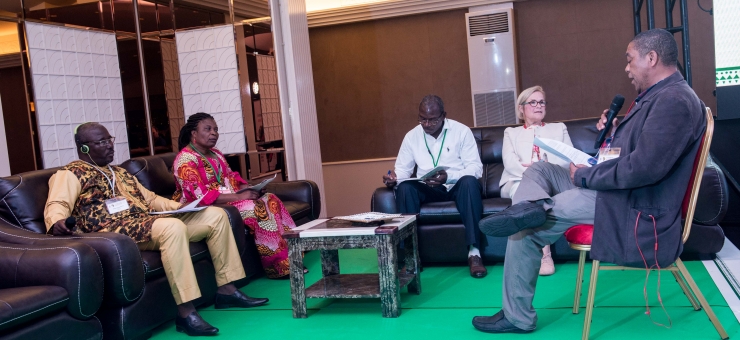News
Organising to win in Africa! DHL in Senegal and other success stories

Just three weeks before the UNI Africa Regional Conference, the conference hosts, SNTPT Senegal, won a massive victory in workplace elections in DHL Express, where the union-backed candidates took 80% of the workplace delegate seats.
"We're incredibly proud of the energy and commitment of our African affiliates," said Post & Logistics head Stephen DeMatteo. "Our unions are ready to fight for a new Africa in the sector. We're focused on growing the role of the post, strengthening our unions and improving the lives of all workers in the sector. It was especially encouraging to hear from our Senegalese sisters and brothers who are bravely standing up to demand their rights and establish their union presence in the likes of DHL. We're hopeful we will replicate their success in Cote d'Ivoire and with other affiliates across the region."
At the conference, UNI Africa’s Director of Campaigns and Organising, Keith Jacobs chaired a roundtable on organising strategy and asked Samba Yombe Mbodji from SNTPT to explain how the DHL campaign started.
Mbodji said, “In fact it started with a football match with the young DHL workers to build relations. Afterwards we continued to strengthen relations by taking part in weddings and other social events. We gained their trust and after a lot of work we managed to allay their fears about the management’s reaction to them forming a union. The rest is history and UNI played an important training and giving support.”
“The next steps are to build capacity. We currently have a few shop stewards but we need many more to move onto collective bargaining. We want to unionise DHL 100% in this region – that’s our ultimate goal. First the workers were scared but now they want achieve this noble goal and its due to the support of UNI staff.”
Other speakers on the Organising roundtable shared similar experiences. Mary Dzinyemba from CIAW in Malawi said that since the union had started it had gone from around 250 members to more than 4000 members in the Commerce and Finance sectors. Madam Dzinyemba said it was impossible to increase union power for workers without the numbers. Thanks to UNI’s training programmes, there were now shop stewards across the sectors and they had a structure from which to collectively bargain.
Gilbert Goh from SYNTRAPOST in Burkina Faso said that when they had started they had 40% union density which had now risen to 68% and increased the number of shop stewards and gained penetration in Chronopost and DHL. Goh paid tribute and said that UNI had been with them every step of the way, training and advising to make this progress. “Without UNI we would never have reached this level of union density,” Goh concluded.
Jacobs then asked the Deputy General Secretary of UNI Global Union, Christy Hoffman to explain how organising fitted into the UNI strategy.
Hoffman said, “It goes back to our Breaking Through strategy which we launched at the UNI World Conference in 2010. The twin goals are to build new unions and grow unions where they are already present. I had the pleasure of meeting with the new DHL delegates – they are young and proud, they are the hope of the future and show we can make it happen.”
The UNI Deputy General Secretary was then asked about the significance of UNI’s Global Framework Agreements. She said that UNI’s 53 agreements, with two signed only last week with GeoPost and Auchan, were significant and went beyond CSR.
Hoffman said, “These agreements make companies think again when they are dealing with our unions and also help take out the fear element for workers. However, they are only truly effective when they are put to the test on the ground. Monitoring is essential. We have to build power on the ground. Without organising and increasing union density we cannot expect employers to take us seriously. We are winning here in Africa. Forward Ever, Backward Never!”

